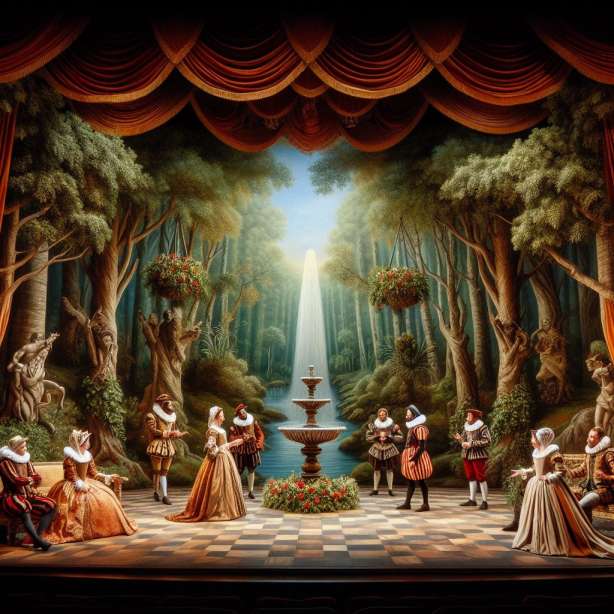William Shakespeare’s beloved romantic comedy As You Like It is considered one of his greatest and most iconic works. This delightful play, believed to be written in 1599, tells the story of its brave and witty heroine Rosalind as she flees persecution in her uncle’s court, finding safety and eventual love in the Forest of Arden.
In this blog post, we’ll analyze the key elements that make As You Like It such an enduring and insightful examination of human nature. But first, a more comprehensive walkthrough of the plot across each act:
As You Like It : Act-by-Act Synopsis
Act I introduces us to the two setting of Duke Frederick’s court and the countryside where Orlando and his elder brother Oliver reside. Orlando is denied his rightful inheritance by Oliver, who hates him. Meanwhile, at court Rosalind has been permitted to stay by her uncle Frederick, even though he overthrew her father, the rightful Duke. Rosalind is kept company by her beloved cousin and friend, Celia. Orlando foils royal wrestler Charles and briefly interacts with Rosalind, stirring her interest. But Frederick becomes paranoid of his popular niece and banishes her.
Act II sees Celia refusing to be separated from Rosalind. The two women disguise themselves and flee to the Forest of Arden along with the court jester Touchstone. Here they purchase a modest cottage and herd from shepherd Corin. Rosalind disguises herself as a young man named Ganymede as extra protection. Meanwhile, Orlando flees his murderous brother Oliver to the forest as well. He posts love poems about Rosalind to the trees. Rosalind, as Ganymede, discovers the poems but keeps her identity secret from Orlando at first.

Act III of As You Like It develops the various subplots spreading in the forest. Lovestruck sheperdess Phebe develops a crush on Ganymede/Rosalind, complicating matters. We meet melancholy traveller Jaques who waxes philosophical. Orlando stumbles onto “Ganymede” and “his sister Aliena” (Celia’s alias) and Rosalind proposes he practice wooing with Ganymede standing in for his Rosalind. She promises to magically make Rosalind appear if Orlando comes to woo her properly each day. Meanwhile, Oliver pursues Orlando to the forest to murder him but has a change of heart. He informing Rosalind her father has been restored as the rightful duke.
Act IV sees Rosalind as Ganymede continuing to toy with Orlando, getting further insight into his sincere feelings for her. Oliver and Celia also fall in love and pledge to marry. Touchstone courts goat-herdess Audrey. Several couples announce wedding plans as love spreads in the forest, prompting Jaques to give his famous “seven ages of man” speech musing on love’s follies over a lifetime.
Act V brings a happy ending and harmony restored all around. Duke Frederick, on his way to attack his brother, has a religious epiphany and gives up his throne. This allows Rosalind’s father to regain his dukedom. Oliver weds Celia as Rosalind meets Orlando, still playing Ganymede. She pretends to use her “magic” to whisk herself in, then reveals she was Ganymede all along, as well as the woman Orlando fell for in court. Phebe accepts young shepherd Silvius’s love since Ganymede is now gone. Several marriages close the play as the characters return to the dukedom under improved circumstances.

Okay, now that you’ve got the full story…let’s analyze some of the key elements that continue to make this clever comedy a lasting pillar of English literature.
Key Factor 1: Rosalind is a Groundbreaking Heroine
The shining star of As You Like It is undoubtedly its central character, Rosalind. She drives the story forward at every turn with her boldness, brilliance and magnetism.
Rosalind completely upends expectations of how a female protagonist “should” behave. While most well-bred young woman of the time would be expected to be demure, obedient and submissive, Rosalind is…none of those things.
Let’s break down some of Rosalind’s most prominent attributes:
- Courageous – She readily disguises herself as a man and ventures out into the unknown Forest of Arden, embracing discomfort and risk for the sake of freedom.
- Witty – Rosalind matches wits with anyone she encounters, outthinking less agile minds at every turn.
- Confident – Unlike many heroines of her day, Rosalind knows her worth and acts in her own interest, rather than passively bending to others’ whims.
- Clever – Rosalind orchestrates brilliant schemes no one else would think of, like having Orlando essentially practice his flirtation skills on her disguised self.
- Articulate – She can express herself eloquently and beautifully, waxing poetic on any subject from love to politics.

In short, Rosalind subverts the audience’s expectations at every turn. And Shakespeare seems keenly aware he is crafting a female lead well ahead of her time.
Rosalind is a prime example why this play is considered so revolutionary when it comes to gender representation. She contains multitudes beyond whatever categories society might limit her with, making her endearingly human.
Key Factor 2: An Insightful Look at Gender Roles
Building on the unusual prominence of Rosalind, As You Like It also provides intriguing insight into gender roles and womanhood in Shakespeare’s era.
Obviously, the scenario of Rosalind dressing as a man allows her to move through the world very differently and grants her power often denied to women. But Shakespeare takes things a step further by also examining masculinity through her disguise as “Ganymede.”
For example, at one point Rosalind-as-Ganymede says the following while pretending to be Rosalind so Orlando can practice wooing:

“Do you not know I am a woman? When I think, I must speak.”
from As You Like It
This is a fascinating snippet because in just one line, Shakespeare touches on gender identity, societal restrictions based on gender, and women’s typical powerlessness.
The layers of meaning reveal his masterful command of subtext. And this is just one of many intriguing moments related to womanhood in the play.
Ultimately, As You Like It gives us new perspective on what it meant to be female in 16th/17th century Europe. And it made audiences consider their own assumptions and prejudices around gender in thought-provoking ways that still hold true today.
Key Factor 3: Pastoral Ideal vs. Reality
Another reason As You Like It remains so relevant is its nuanced look at the appeal yet ultimate hollowness of the “pastoral ideal.”
The pastoral concept grew popular in Renaissance art and literature, imagining country life as a perfect, simple antidote to complicated, messy urban society. The pastoral ideal represents harmony with nature and a wholeness beyond superficial worries.
Yet Shakespeare shows great cynicism around this notion throughout As You Like It. While the Forest of Arden has healing powers for our refugees from court life’s politics and superficiality… it is far from a perfect, utopian paradise.
In Arden we find:
- Greed and pettiness among shepherds over property
- Hardship and weather exposure for those now living outdoors
- Dangerous wildlife like lions and snakes
- Heartsickness over romantic woes
- Existential angst about time passing and death awaiting
While the “country” setting facilitates reconnection and rebirth for Rosalind, Orlando and the others… it is not a perfect, simplistic paradise apart from life’s true complications. There’s no magical solution for those troubles.
Shakespeare seems to recognize the pastoral dream is an attractive mirage in As You Like It, but reality is far more complex. The tensions between court and country life enrich the play enormously.
Selected Significant Quotes
Like any great work of fiction, As You Like It rewards close analysis by containing thought-provoking quotes about life’s biggest themes. Let’s look at a few selected significant excerpts.
”All the world’s a stage / And all the men and women merely players” (Act II, Scene VII)
This quote famously compares life itself to a theater piece, with human beings each playing their assigned roles. It speaks to airs of artificiality and pretense that permeate both royal courts and societal expectations overall.
“True is it that we have seen better days” (Act II, Scene VII)
Spoken by the melancholy Jacques, this poignant line reflects on how nothing gold can stay, with all human works and days fading over time. It adds an air of tragedy amid the play’s lighter comedy.
“The fool doth think he is wise, but the wise man knows himself to be a fool.” (Act V, Scene I)
Touching on essential themes like wisdom, self-awareness and human folly, this quote remains widely shared today. It suggests being a “fool” might simply mean denying one’s own failings and limitations.
There are many other meaty quotes worth sitting with and analyzing at length beyond these three highlights. Shakespeare packs in food for thought alongside fun plot twists in As You Like It.
Notable Film/TV Adaptations
As You Like It continues inspiring new creative works to this day. Here are a few of the most renowned modern adaptations across both film and television:
Film Adaptations
| Year | Director | Notes |
|---|---|---|
| 1936 | Paul Czinner | Stars Laurence Olivier and Elisabeth Bergner |
| 1978 | Basil Coleman | Set in late 19th century Japan |
| 1992 | Christine Edzard | Stars Helena Bonham Carter |
| 2006 | Kenneth Branagh | Stars Bryce Dallas Howard and Kevin Kline |
| 2022 | Phyllida Lloyd | Stars Sophie Okonedo in an Afropunk setting |
TV Adaptations
| Year | Network | Notes |
|---|---|---|
| 1963 | BBC | Stars Vanessa Redgrave |
| 1978 | BBC | Set in Elizabethan period with Helen Mirren |
| 1980 | BBC | Starring Helen Mirren again; most recent “authentic” interpretation |
| 2023 | HBO Max | Stars Solly McLeod in a “modern-day” retelling |
This table summarizes some of the most famous versions adapted for both big and small screens over the years. It attests to the enduring appeal of Shakespeare’s story and characters across eras and cultures.
Some take intriguing liberties by setting the story in unexpected time periods and locales. But most stay centered around Rosalind’s unforgettable voice and perspective.
Why This Play Endures
In conclusion, we’ve explored several of the key strengths that explain As You Like It’s lasting prominence and impact centuries later:
- Rosalind as an ahead-of-her-time heroine
- Incisive look at societal gender roles
- Nuanced take on the pastoral ideal vs. harsh realities
- Universally poignant quotes
- Continuous relevant modern adaptations
But there is so much more depth and richness to unpack in this play than any one blog post could fully address.
Suffice to say As You Like It continues delighting audiences both due to its wit, romance and humor on the surface… as well as its subtle wisdom and insights about human nature. We see shades of ourselves in all its characters and themes – our flaws, hopes, contradictions and desires.
That kind of recognition makes any creative work timeless. Shakespeare knew the human heart and mind amazingly well, earning his perpetual prominence.
For more study material for RPSC First Grade English, Keep visiting NewsWallah.
We still have so much to learn from any read, watch or performance of As You Like It. May As You Like It continue receiving spirited reinventions for centuries onward!








